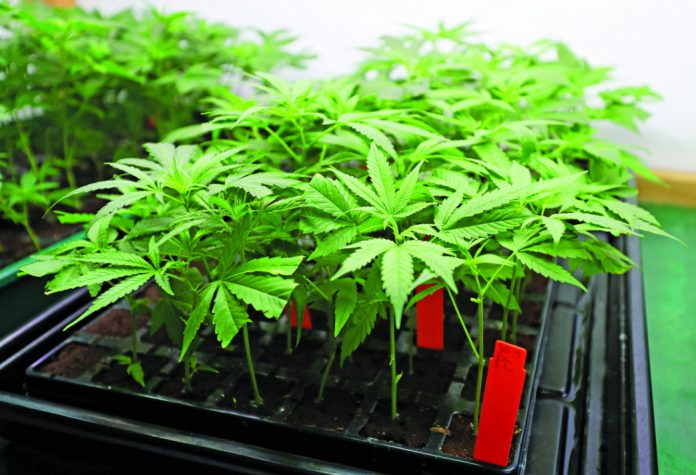After months of deliberation and a countywide vote to adopt a tax structure for the recreational cannabis business, marijuana may be coming to unincorporated San Benito County.
The San Benito County Board of Supervisors voted 4-1, with outgoing Supervisor Jerry Muenzer in dissent, to move forward with a resolution to approve the cultivation and manufacturing of recreational cannabis in unincorporated parts of the county. A final vote is expected Dec. 11.
County voters approved the cannabis business tax measure in June, with nearly 60 percent supporting it.
The county resolution would require filing separate permits for each type of commercial cannabis business. The six cannabis business permit types are cultivation, manufacturing, testing, distribution, microbusinesses, and out-of-county retail.
Microbusinesses are a combination of cannabis operations that include cultivation, manufacturing, distribution and retail. Out-of-county retail sales would allow cannabis delivery services to deliver retail cannabis to customers in neighboring counties.
The ordinance would not allow cannabis dispensaries in unincorporated San Benito County, unlike the City of Hollister.
The city allows dispensaries, cultivation, laboratory testing, distribution and delivery to storefronts. The cannabis dispensaries that come to Hollister can only sell marijuana for medicinal use. Following the county resolution, the city of Hollister’s marijuana regulations will not change.
The resolution before the supervisors will only apply to the unincorporated parts of the county and is similar to ordinances passed by neighboring California counties.
Many counties were left lost when it came to regulating marijuana following the 2016 approval of Proposition 64, which legalized the sale and possession of cannabis. This led to several counties banning cannabis sales or cultivation all together in unincorporated county areas. Proposition 64 may have legalized the recreational use of marijuana, but it gave the power to municipalities to decide if cannabis businesses could get business licenses.
The San Benito County Sheriff’s Office and the Hollister Fire Department raised concerns at the Nov. 20 Board of Supervisors meeting over the need for additional staffing to enforce the incoming unincorporated cannabis industry.
Police Capt. Eric Taylor voiced concern over the difficulty of policing illegal cannabis cultivation along with the challenge of detecting cannabis impairment. Hollister Fire Marshall Charlie Bedolla said his department lacks staffing to handle the existing and emerging cannabis businesses in Hollister.
The San Benito County resolution will require cannabis businesses to renew their permit every year. Employees working at cannabis businesses also need to apply for Cannabis Employee Work Permits before they’re allowed to work.
In July the county hired Hdl Companies, a consulting firm in Brea, California, that specializes in helping government agencies write and adopt laws and cannabis-related government departments, to assist the county in crafting its cannabis ordinance.
The path toward legal commercial cannabis swung from a possibility to a probability after voters in unincorporated San Benito County voted to pass Measure C in the June 2018 primaries. In what was designed to be an informal poll about whether voters would accept commercial cannabis, Measure C also established a basis for how the cannabis industry would pay taxes.
Tax rates will range from $3 to $17 per square foot for cannabis cultivators. Tax on gross sales for distributors will range from 0.5 to 4 percent; for manufacturers, 2.5 to 4 percent; for retailers, 0.5 to 8 percent; and 2.5 to 5 percent for microbusinesses, an exclusive license that allows for every aspect of cannabis operation in one business.
To help regulate the commercial cannabis industry in the county, the Board of Supervisors will create the Cannabis Business Regulatory Agency, to be headed by County Administrative Officer Ray Espinoza.
As Espinoza works to hire staff for the Cannabis Business Regulatory Agency, supervisors Mark Medina and Jaime de La Cruz reaffirmed that funds raised through Measure C taxes should be used to hire additional county staff.
In addition to issuing Cannabis Business Permits and Cannabis Business Work Permits, the Cannabis Business Regulatory Agency will interview applicants, apply rules and issue necessary forms, and will be empowered to add new rules and regulations.
California state law states that individuals need to be at least 21 years old to buy cannabis products or 18 years old with a doctor’s recommendation.
Two new medical cannabis dispensaries, Monterey Bay Alternative Care, 773 San Felipe Road, and Higher Level Care, 1802 Shelton Drive, are expected to open toward the end of spring 2019.
Currently, there are only four cannabis businesses operating in Hollister, according to the city’s Cannabis Affairs Department: Agripharma Extraction LLC, Agripharma Nursery LLC, Agripharma Distribution LLC, and High Sierra Analytics Inc.,, each located at 1851 Airway Drive.
Of the eight cannabis operations in their final occupancy stage, four are expected to be open by the end of January.
They include Pacific Organics & Wellness, 1802 Shelton Drive, distribution; Euphoric Life INC, 807 Industrial Drive, manufacturing; and Hollister Holistics, 1650 Lana Way, cultivation and manufacturing, according to Cannabis Affairs Manager Maria Mendez.
Other pending businesses in the final occupancy stage of development include cultivation and manufacturing businesses Traditional Roots, 1091 San Felipe Road, and LLXP Corporation, 1971 Airway Drive.
Also in the final occupancy stage are CURA CA, LLC, 1650 Lana Way, manufacturing and distribution; YHL INC, and JAMN USA, manufacturing businesses at 1971 Airway Drive; and High-Class Distribution, distribution, 1971 Airway Drive.










